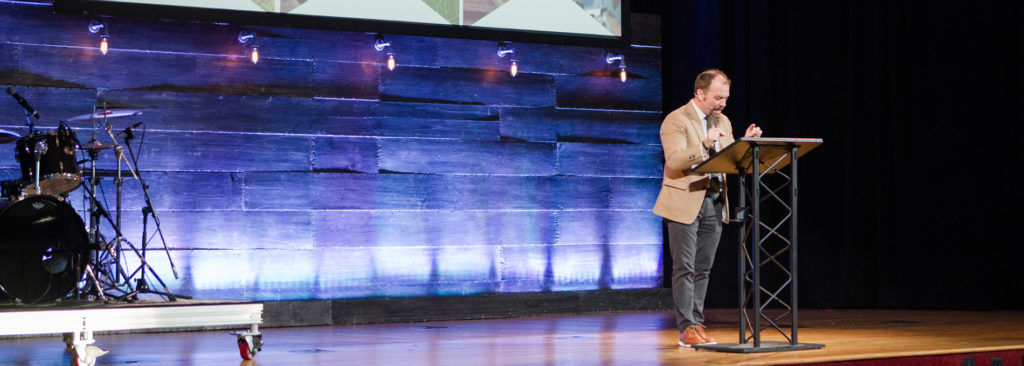Pursuing the Good Life in a Secular World: James K. A. Smith speaks at Southeastern
Nathaniel Williams and Lauren Pratt | March 21, 2018

What vision of “the good life” are Christians pursuing? James K. A. Smith addressed this question at The Wisdom Forum: The Good Life, an event at Southeastern Baptist Theological Seminary (SEBTS) on March 16, 2018.
Smith, professor of philosophy at Calvin College, noted that everyone pursues some vision of the good life, or an idealized version of life.
“It’s not a question of whether you’re chasing the good life, but which,” he said.
Visions of the good life are more caught than taught, he continued, and they are caught from immersion in “cultural liturgies,” or “love-shaping practices.”
Too often, though, Christians think they must compete with their neighbors’ visions of the good life, which are filled with glitz and glamour. As a result, they end up with nothing more than a “Jesus-ified version of secular liturgies.” Instead, Smith urged attendees to follow the example of Jesus.
“Don’t underestimate how brightly the humble shine. Instead, remember that the one who humbled himself is now looked to by the entire world,” he said.
Later in the evening, Smith explained how work intersects with a Christian vision of the good life.
“Work is the way you bear God’s image in the world,” Smith said.
Further, Christians should not reduce their definition of work to only include wage-earning jobs. For example, Smith noted that “the most important and underappreciated work in our culture is the work of homemaking.”
Since work is so important, Christians should be wary of potential work pitfalls such as work environments that reduce image-bearers to cogs in a machine, failing to pay sufficient wages or prioritizing white-collar work over blue-collar. Work, Smith argued, is intimately connected to worship.
“Our work is generated as much by what we want as by what we believe,” he said.
Before the Wisdom Forum, Smith spoke more broadly about how Christians can understand and live in a secular world in a Ph.D. luncheon at SEBTS, hosted by the L. Russ Bush Center for Faith and Culture (CFC).
“The posture that Christians take with respect to secularity and secularism depends a lot on your diagnosis of what it is,” said Smith, setting the stage for his lecture.
Drawing from Charles Taylor, a Canadian philosopher and professor at McGill University, Smith noted four ways to understand and live in this secular age. Smith called this “Taylor’s non-secularist account of the secular.”
This understanding is important for believers, said Smith, to develop “a posture in which we see a secular age less as a threat to defend ourselves from and more as an opening and an opportunity and a challenge both for the renewal of Christianity, but also for what our witness looks like.”
Smith referenced Julian Barnes’ book, “Nothing to Be Frightened Of,” in which Barnes writes, “I don’t believe in God, but I miss him.”
“That, to me, is the most succinct encapsulation of the messy complexity of what a secular age is,” said Smith.
The Wisdom Forum: The Good Life was sponsored by the CFC’s Intersect Project, Kingdom Diversity and The Society for Women in Scholarship. The event also featured talks from Esther Meek, professor of philosophy at Geneva College; D. A. and Elicia Horton of Reach Fellowship; Larry Trotter, of North Wake Church; Jonathan Darville; and Bruce Ashford, Benjamin T. Quinn, Walter R. Strickland II and Matthew Mullins of SEBTS.
To read more about the Wisdom Forum, read this recap at the Intersect Project blog.
To watch the Wisdom Forum talks, click here.
To view pictures from the Wisdom Forum, click here.